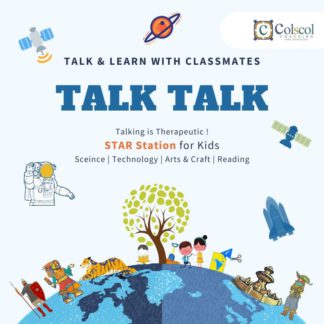Mastery in Mind and Talent
Colscol provide your kid a Virtual educational experience that exhibits programs focusing on science, art, and world cultures . CLASSMATES introduced not only for the children, families and school groups to inspire each other and learn about our world through – Exploration, Imagination, Experimentation and Discovery.
Learning Experience with Talk Talk interactive session that develop your child in a fantastic way.
Learning while your play is the inspiration for Colscol, Keeping in mind each area where the children learn important skills such as problem solving and observation, social and emotional development, cultural understanding, visual and spatial thinking and fine language development.




Exhibits & Programs
- Science
- Technology
- Art & Craft
- Reading
Skills used:
- Auditory Skills
- Cognitive
- Tactile
- Dexterity
- Reasoning
Skills used:
- Auditory Skills
- Cognitive
- Comprehensive
- Communication
- Interpersonal
Skills used:
- Cognitive
- Reasoning
- Tactile
- Dexterity
Educators will read and narrate a story to the group for of various parts of countries with a blend of motivation aspects. Kids will also have a chance to tell
their stories to the other confrere mates.
Skills used:
- Auditory
- Cognitive
- Comprehension
- Interpersonal
Discovery of the benefits of Gardening by Kids to explore how to grow the plants and vegetables and its importance for both Inside-Home or Outside-Home.
Learn about gardening right from sowing to harvesting about day-to-day vegetables and fruits which we eating.
Skills used
- Cognitive
- Comprehension
- Reasoning
- Tactile
Lessons include hands-on activities such as:
- Watering Plants
- Smelling, Tasting and Touching the plants
- Hand Brain Exercises
- Vedic Maths
- English
- French
- German
- Phonic
WHY LEARNING THROUGH PLAY
Each aspect of learning would help your child absorb day-to-day skills like
- Problem Solving
- Observational Learning
- Divergent Thinking
- Social & Emotional Development
- Diverse Culture Understanding
- Visual-Spatial Thinking
- Fine Motors Skills
- Linguistic Development
- Tactile Skills










Nice content … very useful